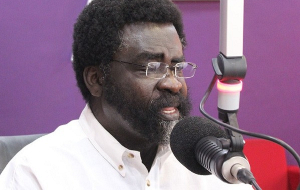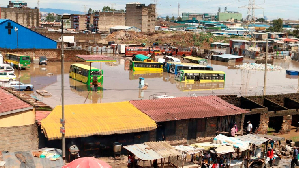Opinions of Sunday, 2 March 2003
Columnist: Press
Darkness in Accra to Bow Out
Streetlights are essential in a modern city anywhere in the world but in Accra, supposedly the gateway to West Africa, the lights just don't come on at night
Accra has been described as the darkest capital in the sub-region. This might be an exaggeration but the reality is that our national capital is simply badly lit.
Often worn out poles sit dangerously in the median of roads in the city - a result of vehicular accident and or general wear and tear. In most cases, however, the poles are healthy-looking but the lights are never on and the few, which come on at night, are often very dim.
Streetlights outside routes regularly used by the President and senior government appointees don't get repaired immediately when they develop faults or are hauled down by drivers.
Criminals have for instance been able to escape arrest because witnesses couldn't see the criminals' faces or the registration number of cars used in committing the crimes because the streets were poorly lit.
But since October last year, the Electricity Company of Ghana (ECG) has been repairing, replacing or mounting new streetlights. This is, however, restricted to 22 ceremonial roads.
The repair works involves replacing bulbs, cables, fuse, choke, poles and installing new streetlights in some cases.
Work has began on roads such as the Cantonments Road which begins from Castle Traffic Lights to the Togo Embassy; the Kanda and Nima Highways; Link Road which starts from the Kaneshie Market to White House, roads around the Accra Stadium, Castle Drive and the Castle Road which begins from Ridge Roundabout to Osu Cemetery.
The ECG has sub-contracted the project to a private company, All Afra Electrical Company Limited.
All Afra Electrical is presently working on streetlights on the Ring Road, Kaneshie-Mallam, and the Graphic and Achimota roads.
Other roads to be covered under the programme scheduled to be completed in April are the Giffard Road, which starts from 37-Roundabout to the Trade Fair Centre, Switchback Road (Flagstaff House to Cantonments Exchange); Second Circular Road (Survey Department to Airforce Officers Mess) and the Fourth Circular Road (Cantonments Exchange to Togo Embassy Roundabout).
But as for roads leading to your home or office, if yours is not along the 22 ceremonial roads you might never get streetlights.
Do you, however, pay your electricity bills? If you do, then for every unit you consume you contribute 50 pesewas to lighting major streets in the country.
So, if in January 2003 for instance you used up 174 units of electricity you probably paid about ?39,678.80. You were charged ?87 to keep lights on our streets.
In 1994, Parliament sanctioned the 50 pesewas per unit of electricity consumed towards streetlights.
But nine years later the charge has lost its meaning. According to the ECG this is woefully inadequate because the actual energy/power consumed by streetlights takes 40 pesewas of every 50 pesewas paid. The ECG is thus left with only 10 pesewas for maintenance and erection of new ones.
Yet, it costs ?7 million to mount a new streetlight according to ECG records.
This is because most of the parts are imported, said an ECG public lighting engineer, Stephen Ayitey.
In 1994, the exchange rate was about ?1,050 to US$1. Today, a dollar is selling at ?8,800, a seven hundred per cent rise in the exchange rate in nine years.
Ayitey said a pole is about ?2.6 million; the luminaire or fittings are about ?1.550 million for one while a bulb sells at ?130,000. A photocell, which is the regulator that turns the light on and off, is about ?266,000. All these exclude cables and the actual cost of mounting the streetlights.
But the ECG is also never able to trace most drivers who knock down streetlights during vehicular accidents.
Ordinarily, the ECG charges culprits with the cost of restoring the destroyed streetlight however Ayitey said up to 60 per cent of such people don't pay any money.
This is largely because by the time the ECG is informed of a damage to a streetlight either the police might have released the car or vehicle involved in the accident to its owner or the culprit might have escaped arrest.
In many other cases, the ECG is unable to trace the owners using the addresses and phone numbers provided by the vehicle owners.
Apart from inadequate resources and vehicles involved in accidents knocking power out of streetlamps, Ayitey said diggings around and across roads by other utility companies such as the Telecom, Ghana Water Company, advertising companies, kiosk owners and cable thieves are responsible for Accra's dark streets.
Opinions











